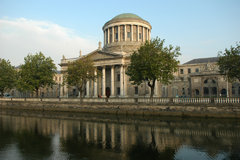Marriage Equality Statement :: Fresh Marriage Equality Challenge for the High Court
6 Jun 2012

New case to be heard to test provisions of Civil Registration Act 2004 and Civil Partnership Act 2010
Marriage Equality today welcomed a decision by Senator Katherine Zappone and Dr Ann Louise Gilligan to issue a fresh legal challenge in their fight to be married under Irish law. The new challenge will test the provisions of the Civil Registration Act 2004 and Civil Partnership Act 2010 which prohibit marriage for same-sex couples.
Fresh proceedings will be issued in the High Court in order to challenge - among other issues - the constitutionality of the Civil Registration Act 2004, which marked the first time marriage was defined in Irish statute as between a man and a woman, and the Civil Partnership Act, which prohibits people who have registered a civil partnership from marrying. The Irish Constitution does not currently include a definition of marriage, but includes a commitment to equality for all citizens.
"We are happy to hear of Senator Zappone and Dr Gilligan's decision," said Marriage Equality Director Moninne Griffith. "This new case will focus on the provisions in both Acts which prohibits people who have a civil partnership from marrying in Ireland, even if they are legally married in another jurisdiction. Their original case was in the High Court in 2006, and so much has changed in 6 years: Civil Partnership was introduced last year, public support has risen from 56% in 2008 to 73% earlier this year, and the government has committed to looking at the issue of marriage equality in the upcoming Constitutional Convention."
"We've seen important developments overseas as well," Ms Griffith continued. "More countries have allowed same-sex couples to marry, the Oxford English Dictionary now includes same-sex couples in its definition of 'marriage', and world leaders including David Cameron, Francois Hollande and Barack Obama have voiced their support for marriage equality."
Marriage Equality's 2011 report "Missing Pieces" found over 160 differences between Civil Partnership and civil marriage, including issues around immigration, finance and family rights. Issues around family rights remain of particular concern to equality groups.
"Irish people understand that the issue of marriage equality is about Irish values - equality and protecting our families - the people we love," added Ms Griffith. "This year, 73% of people said they believe marriage equality should be enshrined in the Irish Constitution. That is a clear indication that as a country we are ready to fulfil our Constitutional commitment to equality for all. We are therefore calling on government to begin work on the Constitutional Convention as soon as possible and to prioritise dealing with the issue of marriage equality therein. This is a key opportunity for the Government to listen to public support and legislate for equality, rather than having the issue decided in the courts."



 Marriage Equality is a proud member of NELFA
Marriage Equality is a proud member of NELFA